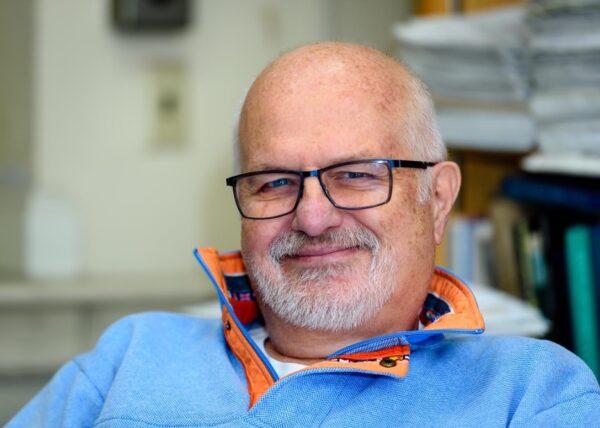
Ronald L. Numbers. Courtesy Robert Streiffer
Renowned historian of science, medicine, and religion Ronald L. Numbers died at age 81 at his home in Madison, Wisconsin, on July 24, 2023. He authored six books and produced some 40 volumes, including edited and translated books; he had an extraordinary scholarly impact.
Born into a strict Seventh-day Adventist family (his father and grandfather were church leaders), he grew up in the United States and Jamaica. He fully expected to remain within that culture, earning his BA in mathematics and physics (1963) at Southern Missionary College (now Southern Adventist University). He had little exposure to the secular world until he went to Florida State University for his MA (1965), and then on to the University of California, Berkeley, from which he received his PhD in history of science in 1969. He remained in the Adventist fold during his early teaching at Andrews University and as an assistant professor of humanities at the School of Medicine at Loma Linda University (1970–74), the flagship of the Seventh-day Adventist Church.
His first published book was not his dissertation but rather a biography of the founder of Adventism—Prophetess of Health: A Study of Ellen G. White (Harper and Row, 1976)—and it marked him as a solid authority on the history of health reform in America and at the same time broke his ties with his religious tradition. Numbers argued that White received her health and dietary teachings not directly from God, as she claimed, but from other health reformers of her era. This work ignited a firestorm of controversy even before publication and led to his forced departure from Loma Linda University and from the church. Numbers’s personal journey from faith to agnosticism informed his scholarly approach to the complex intersection of religion and science.
In 1974, Numbers came to the University of Wisconsin–Madison, where he held appointments in the history of medicine, history of science, history, and religious studies, and where he remained until his retirement in 2013. He was an inspiring teacher of undergraduates, medical students, and the many graduate students who carry his influence into the future. He took particular interest and pleasure in challenging students and debunking historical myths. He served two terms as chair of the history of medicine department and held a named professorship.
Numbers received many awards and honors over his career, including a Guggenheim Fellowship, the Hilldale Award at the University of Wisconsin, the George Sarton Medal from the History of Science Society (HSS), and the Friend of Darwin Award from the National Center for Science Education. He was a fellow of the the American Academy of Arts and Sciences (1995), a fellow of the American Association for the Advancement of Science (2005), and editor of the journal Isis from 1989 to 1993. He served as president of HSS, the American Society of Church History (ASCH), and the International Union of History and Philosophy of Science and Technology.
His major study The Creationists: From Scientific Creationism to Intelligent Design (Alfred A. Knopf, 1992) won the ASCH’s Albert C. Outler Prize. Other key contributions include Darwinism Comes to America (Harvard Univ. Press, 1998), and the magisterial eight-volume Cambridge History of Science (2002–20), edited with David C. Lindberg. Throughout his career, he organized conferences that encouraged intellectual interaction of scholars; from their exchanges, he produced books that garnered wide audiences.
His work in the history of medicine included Almost Persuaded: American Physicians and Compulsory Health Insurance, 1912–1920 (Johns Hopkins Univ. Press, 1978) and some very influential edited volumes. One especially important and controversial work was Sickness and Health in America: Readings in the History of Medicine and Public Health (Univ. of Wisconsin Press, 1978; 2nd ed., 1985; 3rd ed., 1997), edited with . This set of readings intended for undergraduate classes did not follow the traditional focus on famous doctors, but instead looked at social and political issues confronting medicine and public health historically. The book raised the hackles of many in the field and became one of the beacons for the new social history of medicine. Generations of students trained with it.
Ron is remembered for his remarkable scholarship, his enormous energy in networking and connecting scholars, his rigorous standards, his love of intellectual debate, his sense of humor, and his generous and encouraging spirit. He is survived by his daughter, granddaughter, and ex-wife.
Editor’s Note: This essay originally mistakenly identified Ronald L. Numbers as a fellow of the American Philosophical Society instead of the American Academy of Arts and Sciences and the American Association for the Advancement of Science.
Judith Walzer Leavitt
University of Wisconsin–Madison (emerita)
This work is licensed under a Creative Commons Attribution-NonCommercial-NoDerivatives 4.0 International License. Attribution must provide author name, article title, Perspectives on History, date of publication, and a link to this page. This license applies only to the article, not to text or images used here by permission.